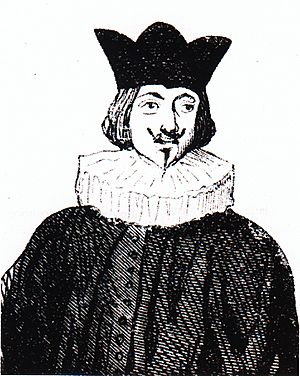Antón de Marirreguera facts for kids
Antón González Reguera, known to many as Antón de Marirreguera, was a very important writer. He wrote the first known books and poems in the Asturian language. One of his most famous works was «Pleitu ente Uviéu y Mérida pola posesión de les cenices de Santa Olaya». This means "Dispute between Oviedo and Mérida over Saint Eulalia's Ashes." He wrote it in 1639 and it even won a poetry prize!
Antón de Marirreguera also wrote other interesting pieces. These include a «Diálogu políticu» (Political Dialogue). He also wrote fables like «Dido y Eneas» (Dido and Aeneas) and «Hero y Lleandro» (Hero and Leander). Plus, he created short plays called entremeses, such as «L'ensalmador» (The Healer), «L'alcalde» (The Mayor), and «Los alcaldes» (The Mayors).
Contents
Life of Antón de Marirreguera
Antón González Reguera was born in the early 1600s, around 1605. His family lived in a place called Llorgozana in Carreño. His family was known as fidalgo, which meant they were from a noble or important family.
He was called Antón de Marirreguera because of his mother, María González Reguera. It is thought that his father, Pedro Álvarez Hevia, passed away when Antón was young. Because of this, Antón took his mother's family name. This was a tradition back then, and it explains why some old papers call him Antonio Álvarez.
His Studies and Work
Antón studied Latin, Humanities, and Theology at the University of Oviedo. He became a priest in 1631. After that, he was in charge of several church areas, called parishes, in Carreño.
Old records show him as Antonio González Reguera, a priest in Priendes from 1640 to 1644. In 1645, he became the priest of Albandi. Here, his name appeared as Antonio González Moñiz. He took this second family name from his uncle, Xoan Moñiz, who was the priest before him in Albandi.
Antón de Marirreguera continued to be the parish priest in Albandi until 1661. His nephew, Xuan Rodríguez Reguera, took over from him. Antón's name does not appear in the records after 1661. So, people believe he passed away sometime between 1661 and 1662.
His Writings
Antón de Marirreguera was known as a writer even when he was at university. His works were very popular during his lifetime. Sadly, many of his writings have been lost over time.
Lost Works and Humility
It is said that Antón de Marirreguera asked his nephew to burn some of his papers before he died. He was a humble person and didn't want people to say that a priest "amused himself doing this sort of thing." He meant he didn't want his writing to seem like a distraction from his religious duties.
We know the names of some of his lost works. These include «Los impuestos» (The taxes), «Padrenuesu» (Holy Lord), and «Razonamientu ente Xuan Moñiz y Pero Suare» (Argument between Xuan Moñiz and Pero Suare). He also wrote «Décimes» (a type of poem). There's also a fable called «Píramo y Tisbe», but it's not certain if the version we know today was written by him.
How His Works Were Saved
The first time his works were printed was by González Posada. He published «Pleitu ente Uviéu y Mérida» and a part of «Dido y Eneas» in a book in 1794.
Later, in 1839, Xosé Caveda y Nava included these two poems in his own collection. He also added «Hero y Lleandro», «Píramo y Tisbe», «Diálogu políticu», and «L'ensalmador».
The most complete collection of his works was put together by Xulio Viejo in 1997. It was called «Fábules, Teatru y Romances» (Fables, Theater and Romances). Xulio Viejo wondered if the "Píramo y Tisbe" fable might have been written by someone else, like Benito de l'Auxa. However, it is known that Antón de Marirreguera did write a work with that same title.
In May 2000, the "Selmana de les Lletres asturianes" (Week of Asturian Letters) was dedicated to Antón de Marirreguera. To celebrate, a play based on his work «L'ensalmador» was performed. It was adapted by Lluis Antón González and directed by Xulio Vixil.
See also
 In Spanish: Antón de Marirreguera para niños
In Spanish: Antón de Marirreguera para niños
 | Georgia Louise Harris Brown |
 | Julian Abele |
 | Norma Merrick Sklarek |
 | William Sidney Pittman |


